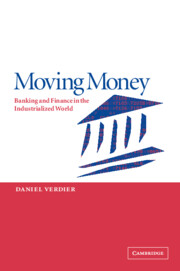Book contents
- Frontmatter
- Contents
- List of figures
- List of tables
- Preface and acknowledgements
- Introduction
- Part I Theoretical conjectures on banking, finance, and politics
- 1 Capital scarcity, capital mobility, and information asymmetry: a survey
- 2 The institutions of capital mobility
- Part II The first expansion (1850–1913)
- Part III The second expansion (1960–2000)
- Appendixes
- Bibliography
- Citations index
- Subject index
1 - Capital scarcity, capital mobility, and information asymmetry: a survey
Published online by Cambridge University Press: 22 September 2009
- Frontmatter
- Contents
- List of figures
- List of tables
- Preface and acknowledgements
- Introduction
- Part I Theoretical conjectures on banking, finance, and politics
- 1 Capital scarcity, capital mobility, and information asymmetry: a survey
- 2 The institutions of capital mobility
- Part II The first expansion (1850–1913)
- Part III The second expansion (1960–2000)
- Appendixes
- Bibliography
- Citations index
- Subject index
Summary
Finance is a rich field of study, pooling contributions from historians, political scientists, and economists. My goal is not to draw up an exhaustive inventory of the existing literature, but merely to situate the approach adopted in this book. I successively look at (1) the historical debate on capital scarcity, on which I offer a new perspective; (2) the use by political economists of the notion of capital mobility, which I try to clarify; and (3) the economic literature on information asymmetry, on which I build my argument.
Capital scarcity
In an article published in 1952, Gerschenkron provided the most ambitious explanation yet offered of why financial structures differ across nations. The more capital was needed in a short amount of time, he argued, the less equity markets could cope with the task of allocating long-term financial capital; instead, banks and state had to step in. Hence the “orderly system of graduated deviations from [the first] industrialization”: British industrialization was self- and market-financed, manufacturers ploughing back profits into their own factories; French industrialization (the 1850–70 spurt) was financed by investment bankers, who raised long-term capital and lent it to factories; German industrialization was financed by universal bankers, intermediating between depositors and factories; and Russian industrialization was financed by the state, raising capital from taxpayers and foreign lenders to distribute it to banks and factories. The need for banks or state intervention reflected economies of scale.
- Type
- Chapter
- Information
- Moving MoneyBanking and Finance in the Industrialized World, pp. 9 - 18Publisher: Cambridge University PressPrint publication year: 2003



